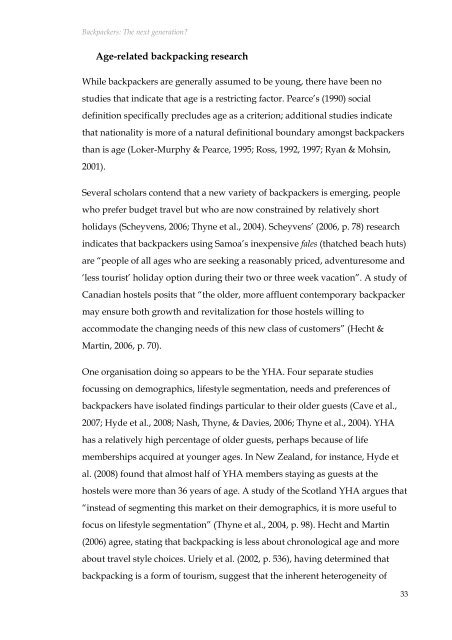Backpackers: The next generation? - Scholarly Commons Home
Backpackers: The next generation? - Scholarly Commons Home
Backpackers: The next generation? - Scholarly Commons Home
You also want an ePaper? Increase the reach of your titles
YUMPU automatically turns print PDFs into web optimized ePapers that Google loves.
<strong>Backpackers</strong>: <strong>The</strong> <strong>next</strong> <strong>generation</strong>?<br />
Age-related backpacking research<br />
While backpackers are generally assumed to be young, there have been no<br />
studies that indicate that age is a restricting factor. Pearce’s (1990) social<br />
definition specifically precludes age as a criterion; additional studies indicate<br />
that nationality is more of a natural definitional boundary amongst backpackers<br />
than is age (Loker-Murphy & Pearce, 1995; Ross, 1992, 1997; Ryan & Mohsin,<br />
2001).<br />
Several scholars contend that a new variety of backpackers is emerging, people<br />
who prefer budget travel but who are now constrained by relatively short<br />
holidays (Scheyvens, 2006; Thyne et al., 2004). Scheyvens’ (2006, p. 78) research<br />
indicates that backpackers using Samoa’s inexpensive fales (thatched beach huts)<br />
are “people of all ages who are seeking a reasonably priced, adventuresome and<br />
‘less tourist’ holiday option during their two or three week vacation”. A study of<br />
Canadian hostels posits that “the older, more affluent contemporary backpacker<br />
may ensure both growth and revitalization for those hostels willing to<br />
accommodate the changing needs of this new class of customers” (Hecht &<br />
Martin, 2006, p. 70).<br />
One organisation doing so appears to be the YHA. Four separate studies<br />
focussing on demographics, lifestyle segmentation, needs and preferences of<br />
backpackers have isolated findings particular to their older guests (Cave et al.,<br />
2007; Hyde et al., 2008; Nash, Thyne, & Davies, 2006; Thyne et al., 2004). YHA<br />
has a relatively high percentage of older guests, perhaps because of life<br />
memberships acquired at younger ages. In New Zealand, for instance, Hyde et<br />
al. (2008) found that almost half of YHA members staying as guests at the<br />
hostels were more than 36 years of age. A study of the Scotland YHA argues that<br />
“instead of segmenting this market on their demographics, it is more useful to<br />
focus on lifestyle segmentation” (Thyne et al., 2004, p. 98). Hecht and Martin<br />
(2006) agree, stating that backpacking is less about chronological age and more<br />
about travel style choices. Uriely et al. (2002, p. 536), having determined that<br />
backpacking is a form of tourism, suggest that the inherent heterogeneity of<br />
33

















